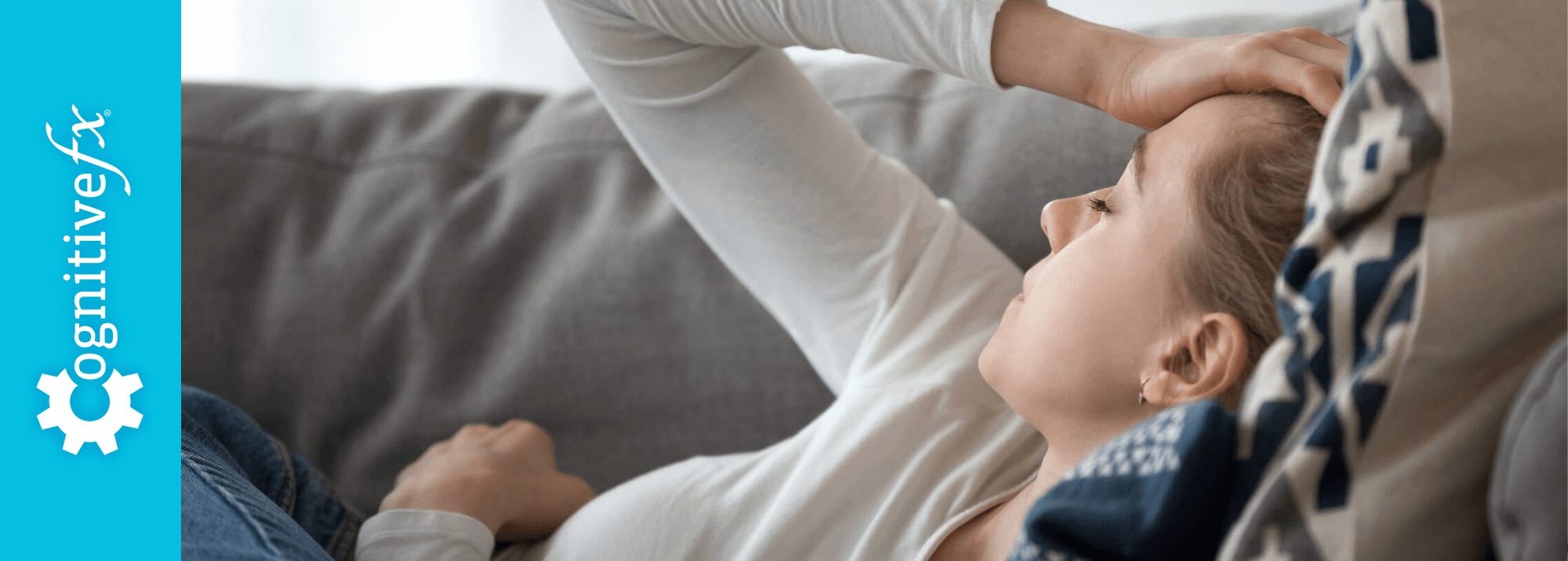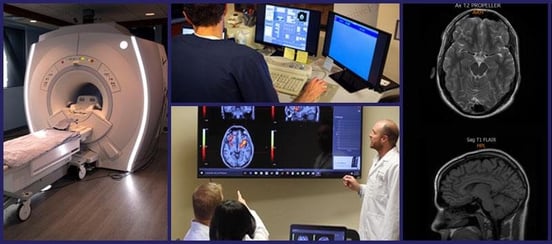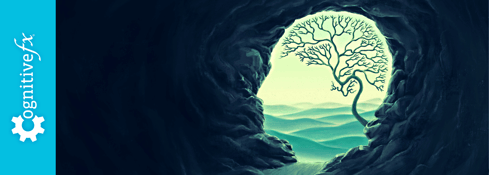How to Tackle Post Traumatic Brain Injury Syndrome
“Post-traumatic brain injury syndrome” refers to long-term repercussions from concussions and other head injuries. Someone using this term could be referring to one of three conditions:

Neural fatigue can develop after any type of brain injury, including mild traumatic brain injury (concussion), severe traumatic brain injury (TBI), hypoxia, viral infection, stroke, or transient ischemic attack. It might surface immediately or after some time and can last for months or even years. It can also develop in patients with neurological disorders, such as Parkinson’s disease, multiple sclerosis, and dementia.
Neural fatigue and physical fatigue, while sometimes present together, are not the same. Patients suffering from neural fatigue can feel totally drained after seemingly simple tasks, such as reading a book, responding to emails, or even just watching the TV. For many patients, neural fatigue only increases the stress and anxiety they’re feeling about how long recovery is taking, leading to worsening symptoms.
Many healthcare providers don’t have the in-house resources to treat post-injury neural fatigue adequately. Instead, they may offer medications (which often don’t help) or advice on how patients can set realistic expectations for their day-to-day lives.
At Cognitive FX, we have better ways to help these patients. We offer a multidisciplinary treatment program that addresses the root of the problems caused by brain injury. Not only does treating the underlying cause result in significant improvements to mental fatigue, but it can also help with other long-lasting symptoms of an old brain injury (such as poor sleep, difficulty concentrating, mental health problems, light and noise sensitivity, and more).
In this post, we’ll explain…
On average, our patients’ symptoms improve by 60% after just one week of treatment at our center specializing in therapy for persistent brain injury issues. To see if you are eligible for treatment, sign up for a consultation.
.jpg?width=1000&height=445&name=How%20to%20Overcome%20Neural%20Fatigue%20from%20a%20Brain%20Injury%20(5).jpg)
Mental or neural fatigue is the feeling that your brain just isn’t working properly. Patients often describe it as brain fog, but there are many other symptoms associated with mental fatigue. (We’ll discuss signs and symptoms later in the article.)
Most mild TBI patients experience this type of tiredness for a short period, though resting for too long after a concussion can mask ongoing neural fatigue. Average recovery times are longer for patients recovering from a severe brain injury. If you’ve been struggling with mental fatigue for months, or even years, you may be suffering from post-concussion syndrome (PCS). Studies suggest about 40% of PCS patients experience this symptom.
This is not the same as the normal fatigue we all get after a long day’s work. Neural fatigue after a TBI does not go away after a good night’s sleep (assuming you can get one — many patients also struggle with sleep problems after a brain injury). Patients with neural fatigue struggle to focus; previously simple tasks may take a long time to complete. They can find themselves rereading the same line repeatedly or drawing a blank in conversation with a friend. Things that would have been easy before the concussion now seem impossible,and it’s easy to feel overwhelmed, impatient, or irritable.
Mental fatigue affects cognitive function and mental activity (especially processing speed, attention, and memory) in patients with both mild and severe TBIs. Some patients only experience mental exhaustion after a particularly taxing cognitive activity, while for others, the feeling is always there. Fatigue can appear rapidly; when it does, most patients find it impossible to continue what they were doing. Once exhausted, many patients find it takes a long time to recover energy (perhaps even days).
Not surprisingly, this symptom can severely limit a person’s ability to lead a normal life and carry out routine daily activities. Many struggle to maintain a job or return to study. Sadly, in many cases, this is interpreted as laziness by friends and family.
.jpg?width=1000&height=445&name=How%20to%20Overcome%20Neural%20Fatigue%20from%20a%20Brain%20Injury%20(7).jpg)
Patients can experience mental fatigue in a number of ways, some of which are more subtle than others. The signs of neurofatigue can be categorized as cognitive, emotional, physical, and behavioral.
While treatment can reduce or eliminate many of these symptoms, learning what triggers these symptoms can also help with recovery. Some everyday activities or situations that may induce greater levels of fatigue include…
Mental fatigue after an acquired brain injury is a complex matter. This condition is probably not caused by a single factor, but by a combination of factors. Primary contributing factors may include:
.jpg?width=552&height=668&name=How%20to%20Overcome%20Neural%20Fatigue%20from%20a%20Brain%20Injury%20(8).jpg) Neurovascular Coupling Dysregulation
Neurovascular Coupling DysregulationMental fatigue after a TBI often develops on account of a disruption in the way brain cells receive the resources they need to operate. This mechanism — called neurovascular coupling (NVC) — involves a network of blood vessels which deliver oxygen and nutrients to specific regions of the brain as they need it.
When affected regions of the brain don’t receive what they need to complete all their tasks, the brain will try to find alternative ways to complete those tasks in a less efficient manner. Inevitably, as the brain is constantly working harder, it is prone to fatigue in much the same way that an overworked muscle becomes fatigued.
One of the areas that seems implicated in fatigue after a concussion is the basal ganglia. Research has found deficits in several brain areas correlating with post-injurymental fatigue. For example, one area that could result in mental fatigue if it isn’t fully functioning is the basal ganglia, which coordinates which areas of the brain are responsible for which tasks. If the basal ganglia is not fully functional due to NVC dysfunction, the brain is essentially operating without a “manager”. This will wear your brain out very quickly, even if you feel you haven’t done much.
If you experience increased mental fatigue levels after demanding cognitive tasks, then NVC dysfunction is a likely cause.
A TBI can also negatively impact the autonomic nervous system (ANS).
The ANS regulates important bodily functions, such as heart rate, digestion speed, and blood pressure. Two important subsystems include the sympathetic nervous system (SNS), which is responsible for our “fight or flight” response, and the parasympathetic nervous system (PNS), which activates the “rest and digest” mechanisms. In simple terms, the SNS is responsible for using energy and the PNS is responsible for restoring energy.
Under normal circumstances, the SNS and the PNS work harmoniously to regulate how your body reacts to what’s happening around you. However, after a concussion or other brain injury, the SNS tends to stay activated most of the time, and this pattern of overstimulation will affect brain function and leave you feeling exhausted all day long.
Further reading: Autonomic nervous system dysfunction after a TBI
Both mild and severe TBIs are known to cause low-grade generalized inflammation in the brain. Astrocytes, one of the support cells of the brain, are particularly affected by this dynamic.
One of the jobs of astrocytes is to regulate and fine-tune the levels of glutamate. Glutamate is essential for brain activity, especially the processing of information, including learning and memory. The problem is neuroinflammation makes it harder for astrocytes to carry out their task. Glutamatergic dysregulation causes unspecific neuronal signaling, which can be a cause of fatigue.
Using advanced brain scan techniques, we can see how our patients' brains respond to treatment. Over 90% of our patients experience symptom improvement after just one week at our clinic.To see if you are eligible for treatment, sign up for a consultation.
Complaints about sleep problems are common among TBI patients. About half of the patients that come to us experience sleep disturbances after a concussion, including sleeping too much (hypersomnia), not sleeping enough (insomnia), or experiencing sleepiness during the day. Some experience sleep apnea.
Not surprisingly, many patients say they still feel physically and mentally tired when they wake up, and they need to take multiple naps just to have enough energy to get through the day. This happens when the areas of the brain which regulate sleep are damaged by a concussion. As a result, the brain is not able to follow normal sleep cycles.
Whether patients can’t get the number of hours of sleep they need, or they’re waking up exhausted despite several hours of sleep, their quality of sleep is insufficient. For many patients, the result of these sleep abnormalities is neural fatigue.
Further reading: What to do about post-concussion sleep problems
Fatigue after brain injury can be a symptom of depression, which is common in concussion and TBI patients. Direct damage to the brain could cause changes that affect a person’s personality and mental health. Alternatively, lifestyle changes caused by the concussion — such as quitting normal activities or living with constant symptoms — may compound post-injury depression and anxiety.
Psychotherapy may help, but if your depression began or significantly increased after a concussion, effective treatment for the concussion is an important part of the healing process.
Further reading:
Vision issues triggered by the concussion are another source of mental fatigue we see in our patients. As these symptoms often go undiagnosed for a long time, many patients are not even aware that vision problems are the source of their fatigue.
For example, patients suffering with eye focusing or eye teaming problems get tired very quickly when they try to work on a computer. Others experience problems with peripheral vision, which causes headaches and fatigue in visually busy places such as shopping centers.
Vestibular dysfunction is another issue that may combine with vision symptoms to produce more fatigue. The vestibular system, located in the inner ears, helps your body to balance and to understand where it is in space at all times. Your body, eyes, and inner ear all work together to give the brain spatial information which it processes and uses to govern your movement. When those signals are wrong or mismatched, you might experience post-concussion dizziness, nausea, difficulty balancing, and other tiring symptoms.
As your brain tries to compensate for these neurological issues, it leads to symptoms like cognitive fatigue, headaches, eye fatigue, and others. Fortunately, vision therapy and vestibular therapy are often effective. One study showed that vestibular rehabilitation after stroke (which causes similar issues to a concussion) improved fatigue and depression symptoms.
Further reading: Vision problems after concussion
Many people don’t realize that concussions and other sources of brain trauma can cause breathing problems. After a concussion, your body can “forget” how to breathe properly. If communication between the brain and lungs is affected by the concussion (including via ANS dysregulation), then you might be breathing too shallowly, too frequently, not often enough, etc. As a result, patients suffer from symptoms such as shortness of breath, dizziness, flushing, and fatigue.
.jpg?width=274&height=411&name=How%20to%20Overcome%20Neural%20Fatigue%20from%20a%20Brain%20Injury%20(3).jpg)
Doctors have had very little success treating neural fatigue with medication. Many of the patients who come to us have tried different prescription and over-the-counter drugs, but most of them haven’t experienced any real benefits and may suffer even worse side effects. (For example, we’ve seen several patients whose doctors couldn’t figure out what was wrong, so they prescribed narcolepsy drugs even though those patients didn’t meet the criteria for narcolepsy. Unsurprisingly, those drugs didn’t improve their fatigue at all.)
Further reading: Medications for post-concussion syndrome
The only exception to this is melatonin. This supplement can improve sleep quality, which in turn helps patients wake up more refreshed and less fatigued. In TBI patients, a study showed that melatonin reduced drowsiness and improved alertness during the day. Consult with your doctor before starting a new supplement. If you want to give melatonin a try, consider a small dose (such as 0.5 mg), and slowly work your way up to a dose that works for you.
Other options for patients suffering from mental fatigue include cognitive behavioral therapy and mindfulness-based stress reduction interventions. There is some evidence to suggest that these approaches can help patients learn to cope. Patients can learn how to pace themselves during the day, take frequent breaks, and avoid situations that require multitasking.
While these approaches may be beneficial, they don’t address the underlying cause of neurofatigue.
At Cognitive FX, we focus on treating the issues that cause mental fatigue: dysfunctional neurovascular coupling, ANS dysfunction, vision issues, and more. We offer a multidisciplinary therapy approach to treat long-lasting brain injury symptoms. Doing so helps to lift the strain on your brain so that you experience less mental fatigue.

Treatment starts with a detailed examination, including…
Key to this process is your functional Neurocognitive Imaging (fNCI) scan. This is a type of functional MRI that examines blood flow dynamics in 56 regions of the brain while you carry out a series of cognitive tasks. This neuroimaging tool also allows us to measure how these regions communicate with each other. In simple terms, we can investigate how much and where in the brain a concussion has affected neurovascular coupling (NVC).
Additional tests look at vision, ANS, and vestibular function because some concussion symptoms develop due to deficits in these areas.
.jpg?width=1999&height=1333&name=How%20to%20Overcome%20Neural%20Fatigue%20from%20a%20Brain%20Injury%20(1).jpg)
With these results, our team can then tailor your treatment plan to promote your neurorehabilitation. Overall, our treatment program — nicknamed EPIC treatment, for Enhanced Performance in Cognition — involves a three-step cycle that repeats multiple times a day: Prepare, Activate, and Recover.
Prepare: This involves short sessions of aerobic exercise followed by breathing exercises to decrease sympathetic nervous system dominance. Physical exercise also improves blood flow within the brain and stimulates the release of neurochemicals (such as brain-derived neurotrophic factor) that help the brain benefit more from subsequent therapy.
.jpg?width=1999&height=1333&name=How%20to%20Overcome%20Neural%20Fatigue%20from%20a%20Brain%20Injury%20(2).jpg)
Activate: At Cognitive FX, we offer a range of different therapies, including occupational therapy, neurointegration therapy, cognitive therapy, sensorimotor therapy, vision therapy, vestibular therapy, and others. Ultimately, the exercises we offer are designed to help restore healthy neurovascular communication throughout the brain.
For example, our clinicians may ask you to balance on a Bosu board (to exercise your vestibular system) and throw tennis balls back and forth (to train hand-eye coordination), while keeping a running tally of simple addition and subtraction (to improve memory and attention) at the same time.
.jpg?width=1999&height=1333&name=How%20to%20Overcome%20Neural%20Fatigue%20from%20a%20Brain%20Injury%20(4).jpg)
Recover: Periods of rest are essential to allow your brain to recover. This is particularly true if you’re experiencing signs of mental fatigue. This may include neuromuscular massage on the neck and shoulders, mindfulness exercises to relax, and the use of brainwaves to benefit your brain in a way similar to meditation.
At the end of treatment, patients undergo a second scan to see how the brain has improved. Patients also meet with our team for a follow-up to assess the results and get a list of exercises to do at home. This typically includes aerobic exercises, cognitive activities, and rest.
.jpg?width=1000&height=445&name=How%20to%20Overcome%20Neural%20Fatigue%20from%20a%20Brain%20Injury%20(6).jpg)
To manage your symptoms at home, it’s also important to identify what factors may be contributing to your mental fatigue. By learning to recognize early signs of fatigue, you can employ coping strategies to increase your quality of life. Some strategies include:
Lack of sleep can affect your cognition, mood, energy levels, and even appetite. For TBI patients, maintaining a healthy sleep pattern is essential to recovering from and managing mental fatigue.
Eating a high-fat, high-sugar diet can lead to mental fatigue. Follow a healthy and balanced diet rich in fruits, vegetables, and nuts, while avoiding fatty and sugary processed foods. For example, studies show that cancer survivors who eat plenty of fish, whole grains, fruits, and vegetables are less likely to experience long-term mental fatigue.
Further reading: Nutrition for brain injury recovery
Exercise may be the last thing you want to do when you’re feeling drained, but it’s an essential way to increase your energy levels, improve your mood, and increase your overall physical well-being. You don’t need to engage for long time periods or at a high intensity to notice benefits. Just do what you can, even if that means dancing to a fun song for five minutes a day and working up to more.
Further reading: Exercise safely after a concussion and the effect of exercise after a brain injury
Reducing stress can reduce mental fatigue and improve mental and physical health. Find ways to limit, or even eliminate, sources of stress in your life. For example, if you feel overwhelmed in noisy situations, go shopping late in the evening or early morning when everything is quieter.
Other options include meditation and mindfulness, breathing exercises, yoga, tai chi, massage, and aromatherapy.
Learn to pace yourself during the day to avoid becoming overtired. If you’re at work, plan what tasks you need to complete according to your energy levels:
A few minutes to rest and recharge during the day can go a long way to stave off mental exhaustion. Rest breaks don’t necessarily mean you need to sleep. A break could be any of the following:
Further reading: How to rest your brain more effectively
Using advanced brain scan techniques, we can see how our patients' brains respond to treatment. Over 90% of our patients experience symptom improvement after just one week at our clinic. To see if you are eligible for treatment, sign up for a consultation.

Dr. Jaycie Loewen is a Clinical Neuroscientist who received her Doctorate of Neuroscience at the University of Utah. Her background includes the study of basic and clinical brain injury, including the publication of research regarding mechanisms of epilepsy pathophysiology. Her work has elucidated the role of glial and neuronal cell profiles in viral-induced brain injury and acute seizures. Dr. Loewen is further a Howard Hughes Medical Institute Scholar, with a Master's in Clinical Investigation awarded in 2018, as well as a recipient of the Higher Education Teaching Specialist Certificate. Through these degrees, she obtained experience with patient care and education as well as an understanding of the necessity of respecting patient experience and symptoms. Dr. Loewen’s focus is firstly patient care and education. She also provides literature analysis and aids in the publication of Cognitive FX’s research. Her goal is to improve Cognitive Fx’s ability to help patients through equal interaction and communication, as well as the furthering of concussion and mild traumatic brain injury treatment and science.

“Post-traumatic brain injury syndrome” refers to long-term repercussions from concussions and other head injuries. Someone using this term could be referring to one of three conditions:

Most patients with COVID-19 recover within a few days or weeks after a brief acute infection. However,about 10%experience long-term symptoms such as brain fog, fatigue, headaches, shortness of...